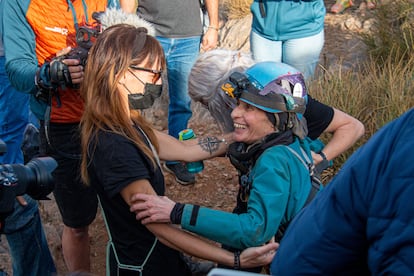Woman who spent over 500 days alone in a Spanish cave emerges: ‘I got along very well with myself’
Beatriz Flamini, 49, was monitored throughout her experience, which will be the subject of a documentary

Seven minutes after 9:00 a.m. (Spanish mainland time) on Friday, a woman named Beatriz Flamini emerged from a cave in Motril, in Spain’s southern province of Granada, where she had been living for over 500 days as part of an experiment that will be the subject of a new documentary.
On leaving the cave, she said that she felt very comfortable inside. “I didn’t want to leave today,” she assured. “At no time did I think about quitting. I got along very well with myself.”
Flamini, a 49-year-old from Madrid, had entered the 70-meter deep cavity on November 20, 2021, as she announced on her social media a couple of days before the start of the experiment. She walked out again on April 14, 2023, for a total of 509 days, or one year, four months and 22 days.
During that time, however, sources from her team admit that she interrupted her experience due to a noise problem and spent six days right outside the cave. After that, they said, she went back inside to complete the adventure, which will be reflected in a documentary. A production company has been behind the project from the beginning.
Flamini was assisted by a psychologist and underwent a medical check-up before appearing before the media at 11:00 a.m.
Little was known about the experiment except for some clues on social media. The stated goal of Flamini, who describes herself as “an alpinist, elite athlete, climber and spelunker” was to remain in a cave alone, in isolation, without time references, without news and without contact with the outside world.
After 300 days of voluntary confinement, Beatriz briefly walked out because she felt, according to sources familiar with the project, “the noise of the router in her brain,” alluding to the computer and router she had with her inside the cave to communicate her basic needs. She spent six days camped next to the cave entrance and, according to the same sources, only had contact with one person, who came in to check the device.
Flamini then decided to continue with her experience, about which little was known except for her message on social media, where she has 4,226 followers.
The cave is located near the coast of Granada, in Spain’s southern region of Andalusia. The cavity has an approximate height of 12 meters. The conditions of her experiment required her to be cut off from the outside world, but she had a computer and a router to send texts and video messages and, at the same time, allow the people monitoring her to keep track of her condition and needs.
The people who have helped her ―a spelunking club from Motril, researchers from the universities of Almería, Granada and Murcia and a company from Madrid― said that these devices were tweaked so that she would be able to send messages and nothing else. In addition, they said, Flamini had no watch or any other device that would allow her to have a time reference. The only thing that allowed her to keep track of time, to some degree, were her own periods.
Food, batteries, light bulbs and all other products that she needed were conveyed to her by members of the Motril spelunking group. Everyone had previously agreed on a spot where they left the supplies for her to collect. When necessary, they would also come to collect her waste.
The stated goal of the experiment was to survive in what Beatriz Flamini calls “self-sufficiency” and also to make a documentary. A representative for Dokumalia, a TV production company, said that Flamini was inspired by their own series Rescate (Rescue) and herself reached out to them to propose this challenge. The company accepted, and the team was joined by several psychologists from Granada, Murcia and Almería, as well as a Madrid chronobiology company that has studied “the circadian rhythms and the sleep of Beatriz under the exceptional conditions in which she found herself.”
University researchers, all from the field of psychology, have also analyzed Beatriz’s personality and its evolution throughout this time, as well as her capacity for suffering, the impact of social isolation and how temporal disorientation has affected her own perception of time.
Sign up for our weekly newsletter to get more English-language news coverage from EL PAÍS USA Edition
Tu suscripción se está usando en otro dispositivo
¿Quieres añadir otro usuario a tu suscripción?
Si continúas leyendo en este dispositivo, no se podrá leer en el otro.
FlechaTu suscripción se está usando en otro dispositivo y solo puedes acceder a EL PAÍS desde un dispositivo a la vez.
Si quieres compartir tu cuenta, cambia tu suscripción a la modalidad Premium, así podrás añadir otro usuario. Cada uno accederá con su propia cuenta de email, lo que os permitirá personalizar vuestra experiencia en EL PAÍS.
¿Tienes una suscripción de empresa? Accede aquí para contratar más cuentas.
En el caso de no saber quién está usando tu cuenta, te recomendamos cambiar tu contraseña aquí.
Si decides continuar compartiendo tu cuenta, este mensaje se mostrará en tu dispositivo y en el de la otra persona que está usando tu cuenta de forma indefinida, afectando a tu experiencia de lectura. Puedes consultar aquí los términos y condiciones de la suscripción digital.









































